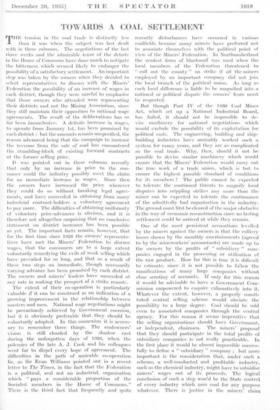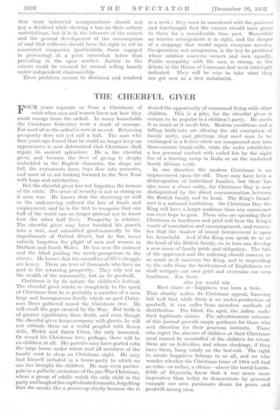TOWARDS A COAL SETTLEMENT
THE tension in the coal trade is distinctly less than it was when the subject was last dealt with in these columns. • The negotiations of the last three weeks and the admirable tenor of the debate in the House of Commons have done much to mitigate the bitternesS which seemed likely to endanger the possibility of a satisfactory settlement. An important step was taken by the owners when they decided to select representatives to discuss with the Miners' Federation the possibility of an increase of wages in each district, though they were careful to emphasise that those owners who attended were representing their districts and not the Mining Association, since they still maintain their opposition to national wage agreements. The result of the deliberations has so far been inconclusive. A definite increase in wages, to operate from January .1st, has been promised by each district : but the amounts remain unspecified, the reason advanced being that the campaign to increase the revenue from the sale of coal has encountered the stumbling-block of existing forward contracts at the former selling price.
It was pointed out in these columns recently that only . by . an increase in price to the con- sumer could the industry possibly meet the claim for an immediate increase in wages. Since then the owners have increased the price wherever they could do so without breaking legal agree- ments, and have succeeded in obtaining from many industrial contract-holders a voluntary agreement to pay more. The difficulties of obtaining uniformity of voluntary price-advances is obvious, and it is therefore not altogether surprising that no conclusive statement on district increases has been possible as yet. The important facts remain, however, that ' for the first time since 1926 the owners' representa- tives have met the Miners' Federation to discuss wages, that the consumers are to a large extent voluntarily remedying the evils of weak selling which have prevailed for so long, and that as a result of these two . steps an immediate, though necessarily varying advance .has been promised by each district. The owners and miners' leaders have succeeded at any rate in making the prospect of a strike remote.
The extent of their co-operation is particularly valuable if it can be construed as an indication of a growing improvement in the relationship between masters and men. National wage negotiations might be precariously achieved by Government coercion, but it is obviously preferable that they should be voluntarily adopted. In this connexion it is neceSs ary to remember three things. The coalowners' vision , is • still clouded by the shadow cast during the unforgotten days of 1926, when the polemics of the late A. J. Cook and his colleagues 'went far to dispel every hope of agreement. . The difficulties in the path . of amicable co-operation lie, as Sir. Evan Williams - pointed out in a recent letter to The. Times, in the fact that the Federation is a political, and not an industrial, organisation which ", pays: a. considerable proportion of the Socialist members in the House of Commons." There is the third fact that frequently and quite recently disturbances have occurred in various coalfields because many miners have preferred not to associate themselves with the political point of view of the Miners' Federation. • In Northumberland the crudest form of blackmail was used when the local members of the Federation threatened to " call out the county " on strike if all the miners employed by an important company did not join the local branch of the political union. As long as each local difference is liable to be magnified into a national or political dispute the owners' fears must be respected.
But though Part IV of the 1930 Coal Mines Act, which set up a National Industrial Board, has failed, it should not be impossible to de- vise machinery for national negotiations which would exclude the possibility of its exploitation for political ends. The engineering, building and ship- building industries have amicably worked such . a system for many years, and they are as complicated as the coal trade. Why, then, should it not be possible to devise similar machinery which would ensure that the Miners' Federation would carry out the true work of a trade union, which is but to ensure the highest possible standard of conditions for its members ? The public cannot be expected to tolerate the continued threats to magnify local disputes into crippling strikes any more than the miner can be expected to tolerate the continuance of the admittedly bad organisation in the industry. The ground must first be cleared of the major obstacles in the way of economic reconstruction since no lasting settlement could be arrived at while they remain.
One of the most persistent accusations levelled by the miners against the ,owners is that the colliery losses shown by the monthly ascertainments (agreed to by the mineworkers' accountants) are made up to the owners by the profits of " subsidiary " com- panies engaged in the processing or utilisation of the raw product. How far this is true it is difficult to estimate, since it is not possible to fo:low the ramifications of many large companies without close scrutiny of accounts. If only for this reason it would be advisable to have a Government Com- mission empowered to enquire exhaustively into it. Whatever the extent, however, a properly consti- tuted central selling scheme would obviate the possibility to a large degree. Coal should be sold even to associated companies through the central agency. For this reason it seems imperative that the selling organisations should have Government, or independent, chairmen. The miners' proposal that they should participate in the total profits of subsidiary companies is- not really practicable. In the first place it would be almost impossible success- fully to define a " subsidiary " company ; but more important is the consideration that, under such a scheme, a • wel;conducted and profitable industry, such as the chemical industry, might have to subsidise miners' wages out of its proceeds. The logical conclusion of such a step would be the State control of every industry which uses coal for any purpose whatever. There is justice in the miners' claim that large industrial amalgamations should not pay a dividend while showing a loss on their colliery undertakings, but it is in the interests of the miners and the general development of the consumption of coal that collieries should have the right to sell to associated companies (particularly those engaged in processing) at a price somewhat below that prevailing in the open market. Justice to the miners could be ensured by central selling boards under independent chairmanship.
These problems cannot be discussed and resolved in a week : they must be considered with the patience and forethought that the owners should have given to them for a considerable time past. Meanwhile an interim arrangement is in sight, and the danger of a stoppage that would injure everyone recedes. Co-operation, not antagonism, is the key to problems whose solution concerns owners and men equally. Public sympathy with the men is strong, as the debate in the House of Commons last week strikingly indicated, They will be wise to take what they can get now as a first instalment.











































 Previous page
Previous page